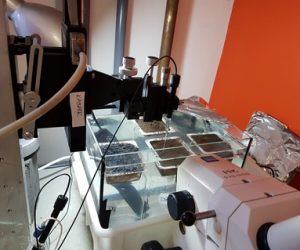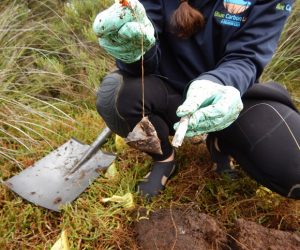Guest Author: Dr. Stacey Trevathan-Tackett
So does that mean you’re the tea bag lady?
Yes, I suppose it does. In 2017, the global initiative TeaComposition H2O began with the aim of better understanding decomposition processes in wetland and aquatic ecosystems. Over 100 participants from 30 countries joined the initiative, deploying green and rooibos Lipton tea bags in their local habitat(s) of choice, with the plan to retrieve them regularly over the next three years. By using that same tea ‘litter’ in ecosystems around the world, we hope to get an idea of the local- to climatic-level characteristics that influence carbon breakdown, and how those factors affect the potential for carbon sequestration in the soils.
This project was the foundation for my ARC DECRA fellowship, set to start in February 2021. During the past two years as an Alfred Deakin Postdoctoral Research Fellow, I was able to start interrogating some of the drivers of tea decomposition:

Temperature effects on marine decomposition are dependent on litter type.
→ Find it at Biogeochemistry

A short-lived nutrient pulse had minimal impact on tidal wetland decay.
→ In Press at Marine Pollution Bulletin

At a continental scale, ecosystem characteristics are a key driver of the microbial breakdown of tea litter.
→ Under Review – Stay tuned!
Now that the three-year datasets are ready, the DECRA fellowship will bring all the data together to interrogate carbon decomposition at a global scale, as well as the metagenomes of the microbiomes involved in the breakdown of carbon. I will also be working in local wetlands to test how wetland restoration and management strategies influences both tea and natural litter breakdown.
There is also a PhD Opportunity associated with the DECRA project. Applications are open for the project “The effects of wetland management on microbial carbon breakdown in Australian wetlands”, and will be perfect for a coastal and freshwater wetland ecologist, biogeochemist and/or microbial ecologist. Contact me if you’re interested in learning more.
Lastly, the work not only involves the collaborators collecting the tea and microbiome data, but also a stellar international team – Peter Macreadie, Ika Djukic (TeaComposition), Aschwin Engelen, and Sebastian Kepfer-Rojas – contributing their expertise in microbial and decomposition ecology, blue carbon, and ecosystem modelling. I’m incredibly grateful for the DECRA opportunity and the dedicated and nice group of people I will be working with, and very much looking forward to what the next three years bring!
